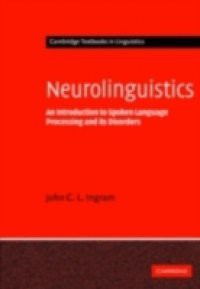What biological factors make human communication possible? How do we process and understand language? How does brain damage affect these mechanisms, and what can this tell us about how language is organized in the brain? The field of neurolinguistics seeks to answer these questions, which are crucial to linguistics, psychology and speech pathology alike. This textbook, first published in 2007, introduces the central topics in neurolinguistics: speech recognition, word and sentence structure, meaning, and discourse - in both 'normal' speakers and those with language disorders. It moves on to provide a balanced discussion of key areas of debate such as modularity and the 'language areas' of the brain, 'connectionist' versus 'symbolic' modelling of language processing, and the nature of linguistic and mental representations. Making accessible over half a century of scientific and linguistic research, and containing extensive study questions, it will be welcomed by all those interested in the relationship between language and the brain.

